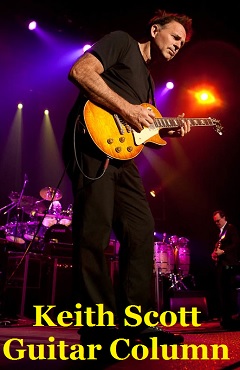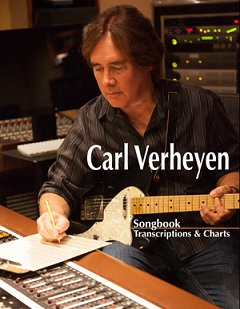Mike Keneally
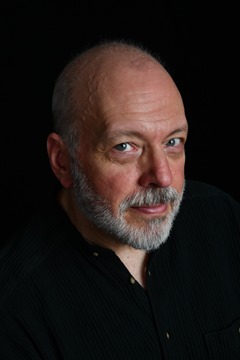
Photo by Martin Mann
The multi-instrumentalist Mike Keneally is known as the guitarist for the late Frank Zappa band, his solo works, contribution for legends like Steve Vai, Joe Satriani, Devin Townsend and numerous others.
There are quite few multi role players who can sing, play guitar, keyboards, write and produce songs. But not many have exceptional skills to play for legendary artists like Frank Zappa band. Steve Vai and Joe Satriani. Mike also is a true magician about composing supreme melodies and took listeners to his own musical planet.
Mike recently released his brand new album “The Thing That Knowledge Can’t Eat”. The album consists of 9 songs and lasts only 42minutes so it is not the most lengthy album he has ever done but they are not average guitar songs, there are full of ideas, characters and pure musical niceness.
We had a chat with Mike Kenearlly himself about his brand new piece “The Thing That Knowledge Can’t Eat”
Interview / Text Mamoru Moriyama
Translation Hiroshi Takakura
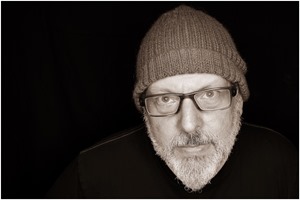
Photo by Frank Wesp
Muse On Muse : After the few chaotic years of pandemic, live music is back on the game and our situation is getting back to normal. You have released brand new album “The Thing That Knowledge Can’t Eat” which is the first time in 7years after the last album “SCAMBOT 2”. How are you feeling now?
Mike Keneally : I’m very happy indeed to finally get this album out! For several years after Scambot 2 I was happy not to think about making an album or even about writing songs, but then around 2018 I started writing new songs and thinking about putting out a new release. I didn’t expect it would take so many years to get an album finished and released, and now that it’s out I’m extremely grateful.
MM : Artists seemed to focus on more writing/production works because they could not do live-shows during pandemic. How was your case?
MK : I was coming to terms with learning how to work my new home studio – for many years I’ve depended on other recording engineers to make my music happen, but during lockdown I had to learn to do it myself, and it was a lengthy process. But I was able to do a lot of writing and recording of new music, including a lot of music that will be on the next album that comes out, as well as recording and production for other artists’ albums – in addition to my own music I also worked on albums for MFTJ, the Android Trio, Pawlie, and Steve McAllister, as well as special projects for Bear McCreary, and one-off tracks for several other artists, so it was a productive time.
MM : Please tell us about the name of the album “The Thing That Knowledge Can’t Eat”
MK : At one point towards the end of the last song on the album, “The Carousel of Progress,” the word “Yielbongura” is sung as a background vocal texture. The word is found in the following quote by author/workshop leader Malidoma Patrice Somé: “In the culture of my people, the Dagara, we have no word for the supernatural. The closest we come to this concept is Yielbongura, ‘the thing that knowledge can’t eat.’ This word suggests that the life and power of certain things depend upon their resistance to the kind of categorizing knowledge that human beings apply to everything. In Western reality, there is a clear split between the spiritual and the material, between religious life and secular life. This concept is alien to the Dagara. For us, as for many indigenous cultures, the supernatural is part of our everyday lives. ” [This quote is from Of Water and the Spirit: Ritual, Magic, and Initiation in the Life of an African Shaman.]
I found this quote inspiring, and that’s where the album title came from. After the album art was completed, I learned that Somé passed away in December 2021. If I’d realized this sooner, I would have dedicated “The Carousel of Progress” to him in the liner notes.
MM : The album consists of 9 songs and is 42 minutes long, which is not the longest album. But all tracks have your taste and mood, and musical spirit which strongly lure us into the Mike Keneally world.
MK : I did want it to have the feel of an adventure through different feelings and scenarios, without taking an enormous amount of time to complete the journey. People are very busy and distracted nowadays, so I think it’s good that the first album I’ve put out for such a long time is relatively easy for people to digest in one listen. Having said that, my next album is probably going to be about 80 minutes or longer – sometimes I can’t help myself.
MM : The album starts with “Logos” which has gorgeous vocal harmony and piano woven with the vox.
MK : That was recorded prior to the pandemic. I sat down at the piano in Scott Chatfield’s house (he runs my record label Exowax) with the goal of writing some music quickly, and that piano part came out within a few minutes. Once I decided I wanted to put lyrics to it, I went looking through a large stack of lyrics I’d written over the years which were never used for one reason or another, and I found the words to “Logos” in that stack – I’d actually forgotten that I’d written them. I thought that the lyrics might suit that music, but I didn’t know what the melody was going to be, so I asked the engineer Mike Harris to record me singing and I’d see what came out. I didn’t expect either that melody, or especially that strange sounding voice, to come out of me at that moment, but apparently it was what the song wanted to happen. Then I thought it would be worthwhile to add additional voices, and I just started layering the vocals. The parts came together very quickly, it was a gratifying session.
MM : “Both Sides Of The Street” and “Mercury In Second Grade” are really good vocal songs which contains your own vibe and unique structure.
MK : “Both Sides of the Street” actually was a song I heard in a dream I had during lockdown; through the years I’ve had a number of songs on my album which were dreamed songs, but they’ve tended to be short, peculiar songs like “Apple Pie” from hat., or “I Guess I’ll Peanut” from Sluggo! I guess “Good Morning Sometime” (another dreamed song) from the Boil That Dust Speck album was more of a conventional tune, and “Both Sides of the Street” is more in that tradition of an actual, somewhat standard pop/rock tune that I dreamed and did my best to remember once I woke up.The dream was: I was onstage with Crosby, Stills, Nash and Young. I was one of their road crew, and at one point everyone onstage was sitting on the floor, except for the drummer, the bass player and me. I was holding somebody’s guitar – I wasn’t a member of the band, I was a roadie, but somehow at the end of the gig I was up there playing this song, although I was faced away from the audience and towards the drummer the whole time I was playing it. The crowd went nuts when the song was over though. I woke up from the dream and got out of bed in the middle of the night, snuck quietly downstairs so as not to wake my wife, and played the guitar part into my phone. After I got some more sleep, I got onto Pro Tools and made the basic track for the version on the album.
“Mercury on Second Grade” was recorded around the time of “Logos,” with Mike Harris engineering. I’d thought initially that I was just going to keep it as a very stripped-down acoustic recording – when I made the track with Mike it was pretty much just a single acoustic guitar, a bass track, and a vocal. Once I was home in quarantine though, I decided to expand the arrangement and added the additional instrumentation. I asked my friend Eric Slick, who was miles away locked down at his own home, to record drums for this song (as well as for another song that’s not finished yet and will be on the next album). When I received his drum track and heard it for the first time, I laughed with glee – he lifted the song into a completely new realm with his choices, I couldn’t have been happier with it.I guess this song sort of recalls my album Wooden Smoke or maybe Wing Beat Fantastic in that it’s based on acoustic guitar. Lyrically it’s pretty much me doing some old-guy-type complaining about people spending too much time on their phones (as though I don’t do the same exact thing).
MM : The heavy hard guitar riff on the intro of “Celery” reminded me of Steve Vai then actual Vai himself is on guitar solos from 2.33 and 3.32! This is a brilliant guitar instrumental, and fans wanted top notch guitar collaboration like this from you and Vai.
MK : I’d had the bones of that song hanging around since 2015, but didn’t start to finalize it until 2020, when I put together my quarantine home-recording rig. While I was working on my guitar tracks for it, I just got the sense that I needed Steve on there to kick it up to a higher level. I sent him a rough mix of what I’d done so far and asked him if he would record two solos on the song, and he sent them back to me almost instantly – he instinctively knew exactly what the song needed, I think. What was nice is that he sent me one track of his unaffected guitar, and a separate track of FX, so if you listen to his ending solo especially, you can hear the reverb on the guitar track getting louder and quieter – I had a lot of fun in the mix changing the level of the reverb, and I think that combination of his amazing playing and the changing FX levels gave the ending part of that song a dramatic character unlike anything else in the album. That in itself felt like a nice collaboration. I’m so grateful that Steve gave so much of his own artistry to that song; I’m honored and humbled to have him on the album, and it feels like a wonderful signpost in our ongoing journey together.
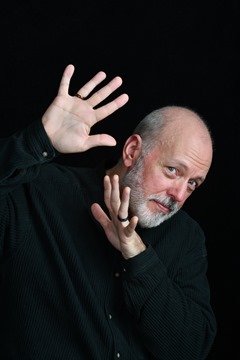
Photo by Martin Mann
MM : The combination of the beautiful arpeggio and vocal melody, and aggressive improvisation of the guitar and piano are extraordinary on “Spigot (Draw The Pirate)”.
MK : Thank you, I’m glad you like it so much. The music for “Spigot” and “Celery” were both composed very quickly in 2015, immediately in advance of me going to Indiana to record with Nick D’Virgilio and Pete Griffin at a recording workshop for engineering students. Nick used to be the drummer for the Mike Keneally Band in the early 2000s (he plays on the album Dog), and he invited me to write a couple of new songs and take part in this workshop.
It was great to play my music with Nick again after so long, and I had just done a bunch of recording with Pete for Scambot 2, so we had a tidy little power trio for that session. After I flew back home I didn’t listen to the results of that session for four years, and in the meantime I’d completely forgotten how the two songs went. In 2019, around the time I was working on “Mercury in Second Grade” and “Logos,” I finally got curious to hear “Spigot” and “Celery” again, and was real gratified to find that I liked them a lot and wanted to finish working on them. I recorded the lead vocal for “Spigot” in 2019 at Chatfield Manor with Mike Harris engineering, then finished the whole thing up with more overdubs at home in quarantine. I was happy to pay tribute in the lyric to Charles M. Schulz, one of the most influential artists in my lifetime – I love his Peanuts comic strips so much, especially the period from the late ‘50s to the mid ‘70s. I honestly think it’s one of the most significant American artistic achievements ever. The back-and-forth guitar and piano were recorded at Sweetwater during the initial session – I’m not sure I’ve ever done back-and-forth solos like that in a song on one of my albums before. It was sort of like the kind of thing I’ll do live sometimes when I’m feeling playful, going back and forth between the instruments, but I hadn’t explored that in the studio so much, and for this song it just felt like it was time to finally go there.
MM : “Ack” has Jazz/Fusion kind of beauty and hardcore madness simultaneously.
MK : It’s the oldest track on the album by a long shot, recorded in the Netherlands in 2006 with members of the Metropole Orkest but not released until now. It was part of an experimental session which was masterminded by Co de Kloet, who is a producer for Dutch public radio (he’s the one who commissioned my orchestral piece The Universe Will Provide in 2003). He put me into a studio with the musicians and told me I had to write two songs on the spot. The first one was “Chee” which ended up on Scambot 1, and “Ack” was the second one. Definitely an interesting challenge to compose something worthwhile on the spot with everyone watching and waiting, and really it’s the brilliance of the Metropole members (and Bryan Beller who was guesting on bass) that make this song take off – they took my quickly composed material and really made it come to life. It was a very rewarding little moment in my life and I’m glad I got two such good recordings out of it.
MM : “Lana” is aggressive, yet unique tune and it stands out from the album.
MK : This one came about as a result of the beautiful Framus guitar that Devin Townsend gave me in late 2019 when I began touring with him. It’s tuned to an open C chord – from bottom to top it’s C G C G C E – and just about everything you play on it automatically sounds great. I was using it at home during lockdown for some recordings I was doing for composer Bear McCreary, and while I was working on Bear’s music, the main riff for “Lana” popped out of me, so I quickly shut down Bear’s Pro Tools session, opened a new one and recorded about a half-hour of guitar experimenting with this new riff and variations on it. Then I edited together the best portions of that experimentation, and that turned into the basic form for “Lana.” But then I decided to insert that much quieter section, with the quirky harmony vocals, a short way into the song – it didn’t interest me so much just to have a heavy riffing song all the way through, I wanted that quick left turn. And then I had fun recording a bunch of crazy harmonized guitar parts with my Strandberg guitar. I’ve seen some people refer to them as Brian May-type orchestral guitar parts, but I don’t know if I ever heard Brian May do anything quite this psychotic sounding – his harmonized stuff is more beautiful and symphonic, mine is a bit more demented. I didn’t record the song to a click track, so the tempo is all over the place, and my friend Ted Morton did a heroic job recording drums to it in his home studio. Not an easy task at all!
MM : The multilayered vocal harmonies are breathtaking on “Big Hit Song”. Its music video is also released.
MK : That was the first song I wrote after about three years away from writing songs. I really enjoyed taking the break from songwriting once Scambot 2 was done, and focusing for a while on working on other peoples’ projects and tours, but in late 2018 I found myself sitting on my bedroom floor knocking out the main guitar chord progression for “Big Hit Song” and I thought, well, guess I’m writing songs again. I reached a certain point in the song and felt like I needed that left turn again, and I remembered a chord progression I’d written on keyboard a few months previously (without necessarily thinking it was going to be part of anything, it just tumbled out one day). That keyboard progression ended up being the representation of “Billy’s big hit song” in the song’s plot line. Of course it’s the least commercial part of the song, which is part of the irony of the thing, but it somehow felt like it belonged in there. Mikko Keinonen’s video for “Big Hit Song” makes me so happy, it absolutely captures the essence of how the song feels to me. In total, Mikko has made videos for five of the songs on the album, and together they comprise the short film called The Complete Adventures of the Unrelated Sound Guy, which as of February 24 can be viewed in its entirety at https://www.unrelatedsoundguy.com/.
Tobias Ralph is the drummer on this one and he knocked it out of the park, as they say. There’s beautiful, subtle little drum stuff all over this song.
MM : “The Carousel Of Progress” starts with comfortable melody, beautiful harmonies and Pop atmosphere, but it changes into unique and dynamic structure.
MK : This was the first thing I wrote in lockdown, after getting my home recording rig up and running. (The first album I recorded in lockdown was MFTJ’s My Mom’s Getting A Horse, but my contribution to that album was primarily improvisational – “Carousel of Progress” was the first fully composed quarantine song that I did.) This song was almost like a puzzle to be solved, and it really provided me a focus I very much needed while still finding my way forward psychologically in quarantine. It was truly a strange time and having this complex piece to work on every day was necessary food for my brain and heart. It took me many months to complete. My wife Sarah was a huge help to me on this one, she was able to hear the big picture on this song whenever I’d get bogged down in details – she actually gave me incredible feedback on the whole album and strengthened it immeasurably. And it meant so much to me to have Malcolm Mortimore play drums on this song – his work on the Gentle Giant album Three Friends from 1972 is seriously some of my favorite drumming ever, I mean just listen to what he does on “Schooldays” on that album, it is absolutely masterful. To have him on my album is profoundly moving for me.
MM : Please tell us about your gears. What guitars, amps, effectors, and pedals did you use for this album?
MK : As mentioned before, I used my Framus and Strandberg guitars, and my trusty green Clapton Strat was also called into service. I have two Taylor acoustic guitars that I used. Several tunes were done with my Rivera Quiana amplifier, but all the stuff I recorded at home used Fractal Axe FX III and Universal Audio plug-ins instead of using a physical amp. Pretty much all the effects heard were Universal Audio plug-ins rather than pedals.
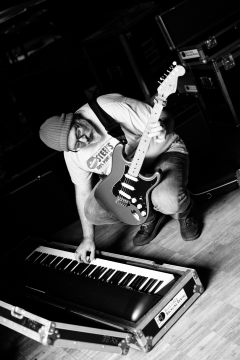
Photo by Marc Mennigmann
MM : You played not only guitar for this project, but also bass, keyboard and vocal. I guess it takes numerous times to keep yourself as a multi-instrumentalist. What is your thought about that?
MK : Organ was my first instrument at age seven, so I had four years on keyboard before I ever tried to play a guitar. I really appreciate being able to jump from one instrument to another, it helps me to keep my own songs interesting to me and allows me to quickly add a lot of color to the arrangements when I’m recording. I just love varied orchestration, and take a lot of pleasure layering different keyboard sounds and guitar tones – I want every song to have a distinct personality sonically. And I just love playing bass, it’s a whole different vibe from guitar. Some of the bass on this album is the fretless bass which was played for years by my dear friend, the late Doug Lunn (the original bassist in Beer For Dolphins). The fretless work at the beginning of “The Carousel of Progress” is me playing Doug’s bass, and when I play his instrument it’s like I can feel his presence coming through me.
MM : You are also a great composer. What is your usual procedure to write/produce songs?
MK : Thank you! I feel very fortunate that very often there are little bits of new music running through my head. I frequently will sing or play those little snatches of melody into my phone and refer to them for later use. I approach making music as though I’m simply a listener rather than a composer – I’m one of those who believe that music is a stream moving through life, and all of us who play music are just trying to grab ahold of a little portion of that stream. So when I’m making a new song, I’ll start with whatever little musical fragment has occurred to me, maybe grabbing one of my phone voice memos as a starting point. I’ll record that little fragment, then I’ll sit back and listen to it and imagine: what do I want to hear next? It’s as if I’m about to place a needle on a record – what sounds do I want to emerge from that record when I put the needle down? I let that sound play out in my head, figure out how to play that sound, and record it. Songwriting/recording to me is just a process of doing that over and over again until the song is complete.
MM : You must have seen how Frank Zappa worked on production/writing. What was your good memory of working with him?
MK : I loved how he practically used us, the members of his band, as though we were manuscript paper in human form – all the new songs on the 1988 tour were written by him on the spot during rehearsals. He would play a passage on the guitar, or sing to us, and we would learn that passage, then he’d move on to the next passage. It was hugely inspirational to me how he’d create an entire arrangement over the course of several hours with us, how creative he was and how patient he was with the process, but still very productive and efficient, getting a lot done in a short amount of time – and it was a huge band, with five horn players, so there was a lot of work to be done, but he was very methodical in his approach. And it was just a lot of fun, we were laughing our heads off while the work was getting done – that might have been the most inspirational aspect of all, that this wasn’t painful, difficult work, but joyous, vibrant work. I knew that I wanted to be that kind of bandleader. When everyone in the band are enjoying the process, it affects the work for the better.
MM : Please tell us about your upcoming plans.
MK : As I’m writing this, I’m at the very beginning of an eight-week European tour with Devin Townsend. I was touring with Devin in March 2020 when COVID caused all touring bands to cancel their travels and fly home immediately, so I’m extremely glad to finally be back on the road with Devin, whose music I love a great deal. It’s so hard to believe it’s three years since COVID sent us home – what a strange time it’s been! I will also be touring later this year with the band ProgJect, playing progressive rock classics from the ‘70s, and I am currently looking to book some dates this year with my own band Mike Keneally & Beer For Dolphins, so that I can continue bringing the music from my new album and my older albums to concert audiences. We did a short tour in January in Southern California and it whetted my appetite to do more. I also play in The Zappa Band (featuring other musicians who played in Frank’s bands), and late last year the band The Bird Brain, of whom I’m a member, released our first EP, and I’d love to do shows to promote that – basically I’m in too many bands, but they’re all so different and I love them all and I want to somehow magically make time stand still so I can play with all of them. I also have a European trio called The Mike Keneally Report, we headlined at the Zappanale festival in Bad Doberan, Germany last year, and I really want to play more with them. Meanwhile, while I was recording The Thing That Knowledge Can’t Eat over the last couple of years, I made a lot of additional music that will be on my next album, and I look forward to having the time to complete that album – it will be significantly more instrumental in nature than Knowledge is, and a bit more peculiar as well, but it’s been so long since I had time to work on it that I’m not exactly sure how it’s going to turn out when it’s finished – but I’m extremely curious to find out! I really love making albums!
MM : Please tell us a message to your fans.
MK : I’m extremely grateful for any fans in Japan who’ve been interested in my work over the years. I have fond memories of a live performance in Nagoya from over twenty years ago, and it’s been way too long since I performed my own music in Japan – I dearly hope I’m able to bring my music there again before too long.
Mike Keneally official website https://www.keneally.com/
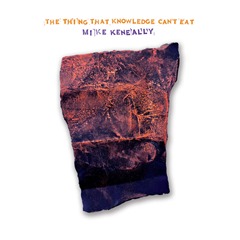
Mike Keneally / The Thing That Knowledge Can’t Eat
1. Logos
2. Both Sides of the Street
3. Mercury in Second Grade
4. Celery
5. Spigot (Draw the Pirate)
6. Ack
7. Lana
8. Big Hit Song
9. The Carousel of Progress
https://store.keneally.com/
https://mikekeneallymusic.bandcamp.com/
